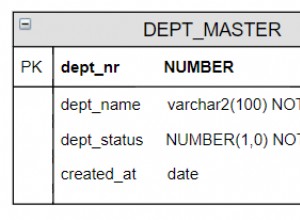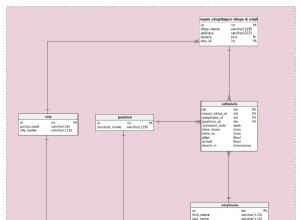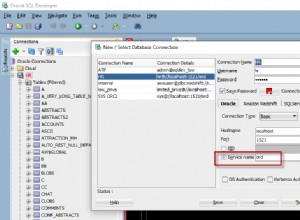Berikut adalah contoh sederhana yang saya lakukan untuk pertanyaan terkait kinerja serupa beberapa waktu lalu yang memanfaatkan indeks kunci utama innodb berkerumun (jelas hanya tersedia dengan innodb !!)
- https://dev.mysql. com/doc/refman/5.0/en/innodb-index-types.html
- https:// /www.xaprb.com/blog/2006/07/04/how-to-exploit-mysql-index-optimizations/
Anda memiliki 3 tabel:kategori, produk, dan kategori_produk sebagai berikut:
drop table if exists product;
create table product
(
prod_id int unsigned not null auto_increment primary key,
name varchar(255) not null unique
)
engine = innodb;
drop table if exists category;
create table category
(
cat_id mediumint unsigned not null auto_increment primary key,
name varchar(255) not null unique
)
engine = innodb;
drop table if exists product_category;
create table product_category
(
cat_id mediumint unsigned not null,
prod_id int unsigned not null,
primary key (cat_id, prod_id) -- **note the clustered composite index** !!
)
engine = innodb;
Hal yang paling diimpor adalah urutan kunci primer komposit kluster product_catgeory sebagai kueri tipikal untuk skenario ini selalu diawali dengan cat_id =x atau cat_id di (x,y,z...).
Kami memiliki 500K kategori, 1 juta produk dan 125 juta kategori produk.
select count(*) from category;
+----------+
| count(*) |
+----------+
| 500000 |
+----------+
select count(*) from product;
+----------+
| count(*) |
+----------+
| 1000000 |
+----------+
select count(*) from product_category;
+-----------+
| count(*) |
+-----------+
| 125611877 |
+-----------+
Jadi mari kita lihat bagaimana kinerja skema ini untuk kueri yang mirip dengan kueri Anda. Semua kueri dijalankan dingin (setelah mysql restart) dengan buffer kosong dan tanpa cache kueri.
select
p.*
from
product p
inner join product_category pc on
pc.cat_id = 4104 and pc.prod_id = p.prod_id
order by
p.prod_id desc -- sry dont a date field in this sample table - wont make any difference though
limit 20;
+---------+----------------+
| prod_id | name |
+---------+----------------+
| 993561 | Product 993561 |
| 991215 | Product 991215 |
| 989222 | Product 989222 |
| 986589 | Product 986589 |
| 983593 | Product 983593 |
| 982507 | Product 982507 |
| 981505 | Product 981505 |
| 981320 | Product 981320 |
| 978576 | Product 978576 |
| 973428 | Product 973428 |
| 959384 | Product 959384 |
| 954829 | Product 954829 |
| 953369 | Product 953369 |
| 951891 | Product 951891 |
| 949413 | Product 949413 |
| 947855 | Product 947855 |
| 947080 | Product 947080 |
| 945115 | Product 945115 |
| 943833 | Product 943833 |
| 942309 | Product 942309 |
+---------+----------------+
20 rows in set (0.70 sec)
explain
select
p.*
from
product p
inner join product_category pc on
pc.cat_id = 4104 and pc.prod_id = p.prod_id
order by
p.prod_id desc -- sry dont a date field in this sample table - wont make any diference though
limit 20;
+----+-------------+-------+--------+---------------+---------+---------+------------------+------+----------------------------------------------+
| id | select_type | table | type | possible_keys | key | key_len | ref | rows | Extra |
+----+-------------+-------+--------+---------------+---------+---------+------------------+------+----------------------------------------------+
| 1 | SIMPLE | pc | ref | PRIMARY | PRIMARY | 3 | const | 499 | Using index; Using temporary; Using filesort |
| 1 | SIMPLE | p | eq_ref | PRIMARY | PRIMARY | 4 | vl_db.pc.prod_id | 1 | |
+----+-------------+-------+--------+---------------+---------+---------+------------------+------+----------------------------------------------+
2 rows in set (0.00 sec)
Jadi itu 0,70 detik dingin - aduh.
Semoga membantu :)
EDIT
Setelah membaca balasan Anda untuk komentar saya di atas, tampaknya Anda memiliki satu dari dua pilihan untuk dibuat:
create table articles_to_categories
(
article_id int unsigned not null,
category_id mediumint unsigned not null,
primary key(article_id, category_id), -- good for queries that lead with article_id = x
key (category_id)
)
engine=innodb;
atau.
create table categories_to_articles
(
article_id int unsigned not null,
category_id mediumint unsigned not null,
primary key(category_id, article_id), -- good for queries that lead with category_id = x
key (article_id)
)
engine=innodb;
tergantung pada khas . Anda pertanyaan tentang bagaimana Anda mendefinisikan PK berkerumun Anda.




